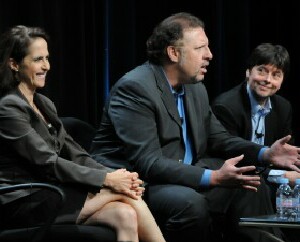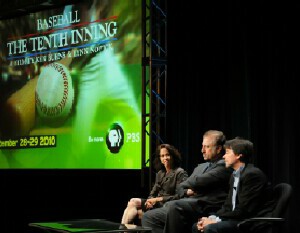PBS at TCA: Ken Burns on Steroids, the Red Sox and Other Reasons Why "Baseball" Needed a "Tenth Inning" - Ed Martin - MediaBizBloggers

Acclaimed documentary filmmaker Ken Burns remains one of the most eloquent recurring guests at Television Critics Association tours. He is also one of the most popular. He told me on Wednesday that he made his first appearance at a TCA event way back in 1985, making his visit at the Summer 2010 gathering to promote the upcoming two-night presentation of PBS' The Tenth Inning his 25th anniversary tour.
Interestingly, it was twenty years ago this summer that Burns came to TCA with the multi-part documentary series that would make him a household name, The Civil War. Four years later he presented another landmark, Baseball, to date the most-watched series in PBS history. Tenth Inning, which debuts next month, picks up where Baseball left off, covering the sport from 1994-2009.
Burns was perhaps a bit more passionate than usual during his panel, given his love of baseball, and the fact that he threw a "perfect strike" at the Dodgers-Padres game at Dodger Stadium the night before as an impressed Joe Torre looked on. (Burns this summer has been throwing the ceremonial opening pitch at baseball games across the country to help promote Tenth Inning.) Burns told me he hadn't fallen asleep until after 1 a.m., not because of any caffeine or sugar consumption, but because he was so excited about his pitch.
Burns told TCA members that he never intended to make a sequel to Baseball (or any of his films), but that he began to think about it after his beloved Boston Red Sox won the World Series in 2004. "I'd had to edit, so painfully, so many terrible moments in Red Sox history: '46, '67, '75, '78, '86," he recalled of making Baseball. "When you edit it, it's over and over again. It's not like you can avert your eyes and walk out of the room and turn off the TV set in disgust. The 2003 season was another horrific defeat, and the fact that they came back made for some pretty great drama, the greatest comeback in the history of our sport."
There were other reasons why Burns saw value in a sequel. "When [we] realized how consequential, in retrospect, the last two decades have been, dealing with the [1994] strike and all the attendant money issues and obviously the gigantic shadow of the steroid scandal [and] all the other amazing stories that make baseball so attractive and appealing, we felt compelled to come back and do it."
One critic lamented that a lot has changed about Major League Baseball during the last decade, and that, for economic reasons among others, it is no longer a sport that the average working class American family can afford to enjoy. Might it ever return to its roots?
Tenth Inning's co-producer and co-director Lynn Novick, who was also on the panel and proved every bit as eloquent as Burns, replied, "I don't know what baseball really could go back to, because it's been a pretty successful business since the 1860s. It has traded on our belief that it is a simple game that anyone could play. That's part of the allure, and they certainly are very good at helping us to continue to perpetuate that at the same time they're charging us a lot of money to enjoy it. Globalization, the Internet, the 24/7 news cycle, the way we deal with celebrities -- baseball is intertwined with all of that. That's one of the reasons why we were so fascinated to go back and take a look at it."

Tackling the wide-ranging steroid scandal that continues to haunt the sport proved especially challenging, Burns said. "It is, in some ways, the most complicated narrative that we've had to construct. How do you talk about the 1998 season [when Sammy Sosa and Mark McGwire filled stadiums across the country]? If you do it from the convenient perspective of hindsight, then it has no meaning. How do you recapture some of that joy and, at the same time, be mindful that you're setting the traps for a tragedy of which we are all un-indicted co-conspirators?
"And then, of course, we had to verify who was actually using if we were going to say they were using, how much was innuendo, how much was leaked material. Remember, a lot of these players, when the taking of steroids was not illegal in Major League Baseball, submitted voluntarily to a test to determine the degree and level of future testing."
Another reporter asked about all the records that were set during that era and all the players caught up in the scandal that would otherwise be eligible for the Hall of Fame.
"You know, it's been a huge, terrible time," Burns continued. "I sort of feel, optimistically, we're on the backside of it and it's looking into the rearview mirror. It did inflate one set of statistics: home runs. But you can be comforted that there weren't lots more 300 hitters. Nobody hit 406, as Ted Williams did in 1941. No one had a 56-game hitting streak, as DiMaggio did, also in '41. It really affected one area, it seemed, and now we seem to be out of it. This is a sport in which statistics matter, but it always requires a story to accompany it. And that's the great beauty of baseball. That's what tricks us into this sense that it's this timeless thing that we'll get back."
One critic who had screened Tenth Inning thought it implied that Barry Bonds, a central figure in the steroid scandal, "didn't really juice a lot or juice at all until he saw McGwire and Sosa."
"That's what's been documented," replied sports journalist Marcos Breton, who was also on the panel and appears in Tenth Inning. "We all saw him in the spring of 1999 when all of a sudden a slender player showed up as the Michelin Man over the course of a winter. All of us were like, 'Well, that's odd.' No one really picked up on it at that time. The whisper sort of grew as time went on, and then, in 2001, when he hit 73 home runs, that was kind of a dead give-away for all of us.
"Bonds really had statistically been the best player in baseball from the early '90s, but he wasn't really viewed that way because of his own personality," Breton continued. "He's easily the most disagreeable person you could ever meet. When [McGwire and Sosa], whom he saw as being lesser players, were getting all of this attention, he reacted."
Exploring these recent issues surrounding the sport "has rearranged our perceptions of baseball in one way," Burns admitted. "But in some ways the ultimate theme of the film is the resiliency of the game."


